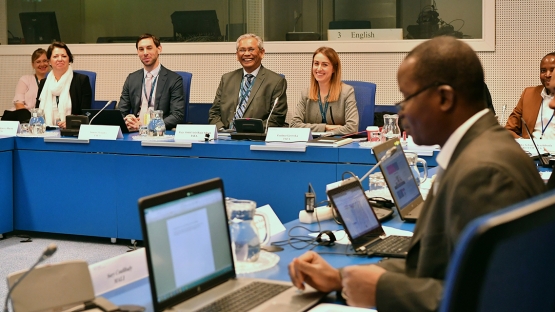Professionals from 10 African countries reviewed the status of their countries’ regulatory frameworks for the security of radioactive material and developed action plans to address any identified gaps during the IAEA’s first School on Drafting Nuclear Security Regulations for African Countries.
The 4 to 7 February event, held in Vienna, was a pilot school focused on nuclear security regulations, with more schools planned for other regions. It was inspired by the IAEA’s well-established School for Drafting Regulations for Radiation Safety.
“A robust legal and regulatory framework is the foundation of a sustainable national nuclear security regime,” said Raja Abdul Aziz Raja Adnan, Director of the IAEA Division of Nuclear Security, as he welcomed the 18 participants. “A precise legal mandate defining roles and responsibilities of the involved institutions and organizations strengthens States’ capacity to prevent, detect, and respond to criminal or intentional unauthorized acts involving nuclear or other radioactive material and facilities.”
Lawyers and nuclear scientists from Botswana, Kenya, Lesotho, Madagascar, Mali, Morocco, Nigeria, Rwanda, Uganda and Zambia took part in the school. Several participants also attended the third School for Drafting Regulations for Radiation Safety for African Countries, which was held immediately before the new security school.
IAEA staff and experts from Canada, Lithuania and the United States guided the participants as they worked on their national regulations for the security of radioactive material and developed action plans. Participants also discussed their experiences and shared best practices.
School participant Assia Lasfar, Nuclear Security Officer at the Moroccan Agency for Nuclear and Radiological Safety and Security, said regulations had to be created with their users in mind. “What will an operator understand when interpreting our regulations and how can we make the implementation of our regulations at facilities as simple as possible?” she said.
Participants discussed how to determine what nuclear security provisions should be included in national regulations, in line with guidance in the IAEA Nuclear Security Series and the Code of Conduct on Safety and Security of Radioactive Sources and its supplementary guidance.
“This is a very practical initiative where both nuclear scientists and lawyers together asses and address gaps in their country’s regulatory framework for the security of radioactive material,” said Paulina Gizowska, IAEA Nuclear Security Officer. “The participants have complete ownership of the process and develop an action plan for regulations in their own countries.”
For several participants, work at the School contributed to efforts under their national Integrated Nuclear Security Support Plans (INSSPs). Such plans, jointly established by Member States and the IAEA, integrate legal and regulatory support into the IAEA’s assistance on nuclear security for robust and sustainable national nuclear security regimes.
The Pilot School was designed and delivered in response to requests from Member States participating in a comprehensive IAEA Project on Enhancing National Regulatory Frameworks for Nuclear Security in African States. The Canadian Government provided resources for the Pilot School through the IAEA’s Nuclear Security Fund.





